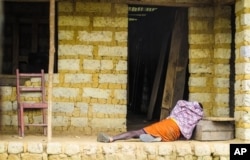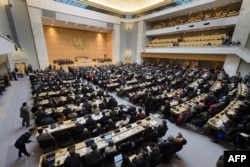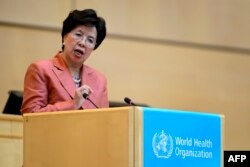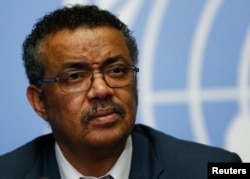The World Health Organization’s Regional Director for Africa says West Africa is better prepared to tackle future outbreaks of Ebola. In an exclusive interview with VOA, Matshidiso Moeti says Liberia, Sierra Leone and Guinea are now able to respond more quickly to emergencies because of upgrades to their surveillance, laboratory and health care systems.
Moeti became head of WHO’s regional office for Africa in February 2015, at the height of the Ebola outbreak in West Africa. As the World Health Organization’s chief troubleshooter in the region, she told VOA she knew she had to do whatever was necessary to stop the spread of this fatal disease.
Ebola had killed more than 11,000 people in the three most heavily affected West African countries by the time WHO declared the transmission of the Ebola virus virtually over at the end of last year.
Warning of flare-ups
Although it acknowledged that the epidemic was no longer out of control, the WHO warned the countries to remain vigilant as flare-ups of the disease were likely to continue for some time.
”We have had a very prolonged last leg of getting to zero in this outbreak and we are not there yet,” said Moeti. But, she added Liberia, Sierra Leone, and Guinea have greatly improved their ability to respond to Ebola and have proved this in their skillful management of the occasional flare-ups of the disease.
“They have been able when they get an unexpected case in these last few months to be able to respond and detect it relatively early, follow-up the contacts and contain the spread. So, for me that is one of the best outcomes of this tragic situation in West Africa,” said Moeti.
But, she cautioned that all the improvements made in infrastructure, in response systems, and in skills training must be sustained. This, she said required the continued support of the International community.
Moeti stressed that the funding and expertise that had poured into West Africa during the Ebola epidemic must hold. “I am very hopeful that some of the commitments that were made by the donors during the time when these countries were talking about their recovery actually do materialize,” she said.
She called this essential “to ensuring that the healthcare workers, the infrastructure, the laboratories, the commodities that are needed to be available on an ongoing basis are sustained.”
Heath emergency reforms
The World Health Assembly, which has just wrapped up its annual meeting, has approved reforms of the emergency health system.
Moeti praised the underlying agreement by member States to provide the money needed to implement this system. She said WHO will be in a better position now to head-off crises before they become full blown. This, she said would prove to be a boon to African countries.
This year’s World Health Assembly had a particularly packed agenda of 76 health issues to consider. The 3,500 delegates who attended the week-long meeting approved 10 new resolutions including the program on health emergencies.
In her closing statement to the Assembly, WHO Director-General, Margaret Chan said the members’ support of this program “sends a powerful political signal” that they wanted WHO to remain “the single agency with universal legitimacy in matters of international health, to lead and coordinate the response to emergencies.”
She also welcomed a resolution on the Sustainable Development Goals that “agreed to prioritize universal health coverage. Of all targets under the new agenda, this is the one that most decisively leaves no one behind. It is inclusive, feasible and measurable.”
Other resolutions adopted by the Assembly include tobacco control; road traffic deaths and injuries; nutrition; HIV, hepatitis, STIs (sexually transmitted infections); access to medicines and integrated health services.
Who will head WHO?
Margaret Chan steps down as WHO chief next year. The race is on to find a new candidate for this position. Among those eager for the job is Ethiopia’s foreign minister and previous health minister, Tedros Adhanom. He is Africa’s first and only candidate for this position.
Matshidiso Moeti called him a “credible candidate,” who has a proven track record in reforming his country’s health system. “I think that he is uniquely placed to understand the needs of the poorest countries,” she said.
Moeti told VOA that she did not believe that previous leaders of the World Health Organization have short-changed Africa. She said they all recognized that Africa was the region with “the highest disease burden, with the largest number of Least Developed Countries, with the weakest health systems in the world.”
She noted that Margaret Chan was very explicit in prioritizing Africa as part of her agenda.
”Of course, I agree that an African person, who has grown up in the system has a unique understanding of the situation, the context, the culture in the region and the types of responses that might or might not work,” she said. “I think that is an added plus without at all thinking that the others have underplayed the needs of the region.”















